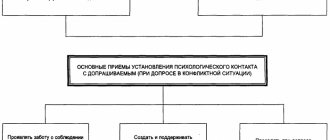When a criminal repents of his crime, he can cooperate with the investigation and confess to his crime of his own free will. Declaring one's own guilt is a process that involves the subsequent execution of many processes and documents accompanying them. For example, in this situation, it is mandatory to draw up a confession protocol. You will learn how to compose it later in the material presented.
Protocol of surrender
Confession with the participation of a lawyer
For every violation of criminal law, punishment will necessarily follow. When considering a case, law enforcement agencies and the court are obliged to take into account not only all the circumstances of the criminal act, but also factors mitigating the punishment. Their list according to the Criminal Code of the Russian Federation also includes a confession, which consists of the following:
- the guilty person voluntarily and without coercion makes a statement about an illegal action or inaction that entails criminal punishment;
- confession means submitting a written statement about a crime or an oral report - in the second case, all circumstances will be recorded in the procedural protocol;
- This form of communication will make it possible to mitigate sanctions if the citizen has already been actually detained on suspicion of committing a crime.
Note!
Confession after arrest is not considered as a factor mitigating punishment. However, a detained citizen can actively cooperate with the investigation and help solve the case. In this case, he can also count on a mitigation of his fate.
Since surrender is considered by the Criminal Code of the Russian Federation and the Code of Criminal Procedure of the Russian Federation as a procedural event, the citizen must be given the right to defense. To do this, you can choose a lawyer to fill out the confession form or ask for a public defender. A citizen may refuse to invite a lawyer; such a decision is recorded directly in the protocol.
It is best to consult with a lawyer in advance about the consequences of voluntarily reporting a crime. This is necessary because:
- Citizens are often mistaken about the nature and consequences of their actions. The act may fall under the Code of Administrative Offenses of the Russian Federation or may not be punishable by law at all;
- when appearing, you can declare the commission of several criminal acts, but such a decision must correspond to the chosen defense tactics;
- In consultation with a lawyer, you can evaluate the composition of the evidence for possible prosecution. If the prospects for solving the case are unclear, the lawyer will advise against turning himself in to protect the client's interests.
Turning yourself in with a lawyer will allow you to avoid unlawful actions on the part of the inquiry officer or investigator. Often, taking advantage of the applicant’s stressful situation, law enforcement agencies force him to confess to crimes that the citizen did not commit. The presence of a defender will help avoid such situations.
If a confession under the Criminal Code of the Russian Federation is made in writing, the statement must set out all the circumstances of the crime committed. The lawyer must make sure that such a decision is voluntary and that there are no facts of threats or coercion on the part of the interrogating officer. If an application to appear is issued after the citizen has been detained, he will be able to reduce the punishment only if he reports other crimes that are not yet being investigated.
When filling out the confession protocol form, the lawyer has the right to submit comments and explanations, as well as demand accurate indication of all the information provided by his client. Even if the investigator considers such explanations or additions to be irrelevant to the case, he is obliged to record them in the protocol. Otherwise, the defense attorney will seek to exclude the protocol from the case file.
…
Article 142. Code of Criminal Procedure of the Russian Federation
1. A statement of confession is a voluntary report of a person about the crime he has committed.
2. A statement of confession can be made either in writing or orally. An oral statement is accepted and entered into the protocol in the manner established by part three of Article 141 of this Code.
Paragraph 7 of the Resolution of the PVS of the Russian Federation dated January 11, 2007 N 2 “On the practice of imposing criminal punishment by the courts of the Russian Federation.”
When imposing a sentence, the court has the right to recognize as mitigating the punishment any circumstances established at the court hearing, including those not provided for in part one of Article 61 of the Criminal Code of the Russian Federation.
Confession as a circumstance mitigating punishment is taken into account in cases where a person, orally or in writing, voluntarily informed the body carrying out criminal prosecution about a crime committed by him or with his participation (Article 142 of the Code of Criminal Procedure of the Russian Federation).
A report of a crime made by a person after his arrest on suspicion of committing a crime does not exclude the recognition of this report as a mitigating circumstance. If the investigative authorities had information about the crime (testimony of victims, witnesses, procedural documents, etc.) and the detained person knew about it, then his confirmation of the fact of participation in the commission of a crime cannot be regarded as a confession, but is recognized as other mitigating circumstances (for example, incriminating other participants in the crime).
If a person’s message about a crime committed with his participation, together with other evidence, is used by the court as the basis for a conviction, then this message can be considered as a confession even in the case where the person changed his testimony during the preliminary investigation or at the court hearing.
A report by a person detained on suspicion of committing a specific crime about other crimes he has committed that are unknown to the criminal prosecution authorities should be recognized as a confession and taken into account when assigning punishment when convicted for these crimes.
In the case of a totality of crimes committed, surrender as a circumstance mitigating punishment is taken into account when assigning punishment for the crime in connection with which the person surrendered.
Resolution of the Presidium of the Supreme Court of the Russian Federation dated January 10, 2007 N 692-P 06 The sentence in relation to a person convicted of murder is subject to change, the imposed punishment to be mitigated, since the court, having checked the case materials, recognized the confession as a circumstance mitigating the punishment.
The Presidium of the Supreme Court of the Russian Federation consisting of: presiding officer - Radchenko V.I., members of the Presidium - Karpov A.I., Kuznetsov V.V., Magomedov M.M., Nechaeva V.I., Petrochenkova A.Ya., Razumova S.A., Sviridova Yu.A., Serkova P.P. - examined the criminal case on the supervisory appeal of the convicted O. A. against the verdict of the Perm Regional Court of February 27, 1997, by which O. A., ..., unconvicted, was sentenced to imprisonment: under Article 170 part 2 of the Criminal Code of the RSFSR for 5 years; under Article 167 Part 2 of the Criminal Code of the Russian Federation (as amended by the Federal Law of June 13, 1996) to 4 years; under Article 147 Part 3 of the Criminal Code of the RSFSR to 10 years with confiscation of property; under Article 17, Article 102 paragraphs “a, e, n” of the Criminal Code of the RSFSR for 13 years. Based on Article 40 Part 1 of the Criminal Code of the Russian Federation * for the totality of crimes, by partial addition of punishments, 15 years of imprisonment with confiscation of property, to be served in a general regime correctional colony, were finally imposed. *Probably an error in the original. It should be read: “Article 40 of the Criminal Code of the RSFSR” It was decided to recover from O-va, P-n and P-in jointly and severally in favor of S-voy I. material damage in the amount of 8 million 610 thousand (non-denominated) rubles and compensation for moral damage in shared order - 20 million (non-denominated) rubles from each. By the ruling of the Judicial Collegium for Criminal Cases of the Supreme Court of the Russian Federation dated September 4, 1997, the verdict against O-va was changed: the qualifying sign of fraud - “on a large scale” - was excluded. His actions under Article 170 Part 2 of the Criminal Code of the RSFSR were reclassified to Part 1 of Article 170 of the Criminal Code of the RSFSR, under which 3 years of imprisonment were imposed. Based on Article 40 of the Criminal Code of the RSFSR for the totality of crimes provided for in Article 170 Part 1, 147 Part 3, Article 17, Article 102 paragraphs “a, e, n” of the Criminal Code of the RSFSR, Article 167 Part 2 of the Criminal Code RF, 15 years of imprisonment with confiscation of property, to be served in a general regime correctional colony, were finally imposed. Otherwise, the sentence was left unchanged. P-n G., P-in A., N-n L. were also convicted in this case, but supervisory proceedings were not initiated against them. In the supervisory complaint, the convicted O-v asks to reclassify his actions in terms of conviction for fraud and destruction of property under Article 15, Part 3 of Article 147 of the Criminal Code of the RSFSR and Part 1 of Article 167 of the Criminal Code of the Russian Federation and mitigate the punishment. Having heard the report of the judge of the Supreme Court of the Russian Federation S.A. Vorozhtsov, who outlined the circumstances of the criminal case, the content of the verdict, the cassation ruling, the motives for the supervisory appeal and the issuance of a resolution to initiate supervisory proceedings, the objections of the victim S. I., who asked not to cancel or change the verdict , the opinion of the First Deputy Prosecutor General of the Russian Federation B. A., who believed the complaint to be partially satisfied, the Presidium of the Supreme Court of the Russian Federation established: O., taking into account the changes made to the verdict, was found guilty of abuse of official position, fraud committed by an organized group, and in organizing the premeditated murder of S. by prior conspiracy by a group of persons, for selfish reasons, in order to conceal another crime. The crimes were committed in Perm in April-July 1996 under the following circumstances. O-v and P-n, working as detectives of the criminal investigation department of the Sverdlovsk district of the city of Perm and being representatives of the authorities and officials, out of selfish interest, contrary to the interests of the service, using their official position, created an organized group, which, in addition to them, also included N-n and P-in. In April 1996, they decided, through deception and forgery of documents, to take possession of someone else’s property - two-room apartment No. 21, located in house No. 65 on Komsomolsky Prospekt, where S. B. lived and which they intended to sell for 120 million (non-denominated) rubles, and divide the money among themselves. For this purpose, O., using his official position, removed from the housing department No. 7 an registration card in the name of S., pasted N.’s photograph into it, with the intention of issuing a false passport for N. in the name of S. P., using his official position contrary to the interests of the service, sent to the visa and passport service of the Internal Affairs Directorate a request for an registration card, Form No. 1, addressed to S. Having received the card, O-v and P-n removed S-va’s photograph from it and pasted in N-n’s photograph. Further, according to the previously developed plan, O-v, P-n and N-n prepared the necessary documents for N-n to obtain a passport in the name of S-va. On April 23, 1996, N. received a passport in the name of S. and, together with O. and P., prepared the relevant documents for the privatization of S.’s apartment. On May 17, 1996, they privatized this apartment, and on June 17, 1996, in order to sell this apartment, they notarized a purchase and sale agreement for the apartment to N-nim P-inu. Then, in order to conceal the fraud, O-v suggested that P-in and P-n kill S-v, to which the latter agreed. O-v, abusing his official position, on July 4, 1996, called S-v into his office, where P-in and P-n were, introduced them to S-v as police officers who would carry out investigative actions to uncover the previously committed crime. S-va theft. Carrying out the intent to kill S-va, P-in and P-n arrived at the victim’s apartment, where P-in struck S-in several blows to the head with an object not established by the investigation, and P-in also struck multiple blows to the head with his heel shoes. He squeezed the victim’s neck with an object not established by the investigation, and then handed P-n an electrical cord, with which P-n squeezed the victim’s neck. At the same time, P-in sharply turned S-va’s head, damaging the cervical vertebrae. As a result of joint and coordinated actions, S. suffered a traumatic brain injury, accompanied by multiple fractures of the bones of the vault and base of the skull, and fractures of the cervical vertebrae, which resulted in his death. After that, P-n, P-in and O-v took the victim’s corpse, furniture and personal belongings from the apartment to the city landfill, where they set everything on fire and fled the crime scene. In the supervisory complaint, the convicted O-v claims that his actions were incorrectly classified under Part 3 of Article 147 of the Criminal Code of the RSFSR as a completed crime, since he did not receive money for the apartment and asks to reclassify these actions as Article 15, Part 3 of Art. 147 of the Criminal Code of the RSFSR. In addition, he does not agree with the qualification of actions under Part 2 of Article 167 of the Criminal Code of the Russian Federation. According to the convicted person, the victim’s property was destroyed by burning in a city landfill, so there was no threat of harm to citizens or other property. In this regard, he requests that the actions in this part of the charge be reclassified to Part 1 of Article 167 of the Criminal Code of the Russian Federation. Taking into account the information about his personality and the degree of social danger of his crime, as well as the changes made to the verdict by the court of cassation, O-v asks to commute his sentence. Having considered the supervisory appeal, the Presidium of the Supreme Court of the Russian Federation finds it subject to partial satisfaction for the following reasons. O-va’s guilt in the crime was confirmed by the evidence examined at the court hearing and presented in the verdict and is not disputed by the convicted person. According to the meaning of the law, theft is considered completed if the property is confiscated and the perpetrator has a real opportunity to dispose of it at his own discretion. It does not require that the perpetrator actually use the property. The only thing that matters is that, having taken possession of someone else’s property, he received such an opportunity to dispose of it. From the case materials it is clear that O-v, P-n, P-in, N-n by deception took possession of someone else’s property - S-va’s apartment, privatized it in the name of N. and drew up a fictitious contract for the sale and purchase of this apartment, according to which Nikitin sold the apartment to P. Thus, they disposed of the stolen property at their own discretion. In this regard, the Presidium finds the arguments of the O-va’s complaint that his actions amounted only to an attempted theft of an apartment, and not a complete act of fraud, to be unfounded. At the same time, the Presidium believes that court decisions regarding the Island are subject to change. Qualifying the actions of O. under Part 2 of Article 167 of the Criminal Code of the Russian Federation, the court proceeded from the fact that the property of O. was burned by him. Meanwhile, within the meaning of the law, the deliberate destruction or damage of individual objects using fire under conditions that exclude its spread to other objects and the emergence of a threat of harm to the life and health of people, as well as other people’s property, should be qualified under Part 1 of Article 167 of the Criminal Code of the Russian Federation, if the victim suffered significant damage. From the case materials, it appears that O. set fire to S.’s property in the area of the city landfill, which excluded the possibility of causing harm to other people’s property or the spread of fire to other objects. Taking into account the above actions, O-va should be reclassified from Part 2 of Article 167 of the Criminal Code of the Russian Federation to Part 1 of Article 167 of the Criminal Code of the Russian Federation as the deliberate destruction of someone else’s property, causing significant damage to the victim. Within the meaning of the law, the qualification under clause “e” of Article 102 of the Criminal Code of the RSFSR of the murder of a certain person committed by the perpetrator in order to conceal another crime or to facilitate its commission excludes the possibility of qualifying the same murder, in addition to the specified clause, under any other clause of Article 102 of the Criminal Code of the Russian Federation* *. **Probably an error in the original. It should be read: “Article 102 of the Criminal Code of the RSFSR” The court found that the murder of S. was committed with the aim of concealing another crime - fraud, therefore, the qualifying feature of murder provided for in paragraph “a” of Article 102 of the Criminal Code of the RSFSR must be excluded from the verdict - “for selfish reasons.” Otherwise, the legal assessment of the Island’s actions was given correctly. In addition, as can be seen from the verdict, the court took into account “public opinion” when imposing the punishment. This instruction of the court is not based on the law, therefore it is subject to exclusion from the sentence. Taking into account the changes made to the Criminal Code of the Russian Federation by Federal Law No. 162-FZ of December 8, 2003, an additional punishment in the form of confiscation of property should also be excluded from the sentence in relation to O-vkov. Taking into account changes made to court decisions, O-v’s punishment for the totality of crimes is subject to mitigation. Based on the above and guided by Article 407 and paragraph 6 of Part 1 408 of the Code of Criminal Procedure of the Russian Federation, the Presidium of the Supreme Court of the Russian Federation decided: 1. Supervisory complaint of the convicted O-va A.V. partially satisfy. 2. The verdict of the Perm Regional Court dated February 27, 1997 and the ruling of the Judicial Collegium for Criminal Cases of the Supreme Court of the Russian Federation dated September 4, 1997 in relation to O. A. amend: to exclude his conviction on the qualifying criterion of murder - “for mercenary motives”, provided for in Article 17, paragraph "a" of Article 102 of the Criminal Code of the RSFSR; an indication that “public opinion” is taken into account when assigning punishment; exclude additional punishment in the form of confiscation of property, both under Part 3 of Article 147 of the Criminal Code of the RSFSR, and for a set of crimes; reclassify his actions from Part 2 of Article 167 of the Criminal Code of the Russian Federation to Part 1 of Article 167 of the Criminal Code of the Russian Federation, according to which a sentence of 1 year and 6 months of imprisonment is imposed. On the basis of Part 1 of Article 40 of the Criminal Code of the RSFSR for the totality of crimes provided for in Article 170 Part 1, 147 Part 3, 17, 102 paragraphs "e, n" of the Criminal Code of the RSFSR and Part 1 of Article 167 of the Criminal Code of the Russian Federation , the O-vu will finally impose 14 years of imprisonment to be served in a general regime correctional colony. The rest of the court decisions regarding the Island remain unchanged. Chairman V.I. Radchenko.
Did the answer help you? Yes No
Confession without the participation of a lawyer
It is possible to report a crime without the presence of a defense lawyer if the citizen voluntarily confirmed such a decision. Law enforcement officials are required to comply with the following formalities:
- explain the right to call a lawyer, as well as all the consequences of refusing to do so;
- ensure the calling of a defense lawyer if the citizen stated this already at the time of drawing up the protocol;
- record in the protocol the applicant’s refusal to call a lawyer, the reasons for the refusal (if they were expressed by the suspect), as well as an explanation of the consequences of such a decision.
Note!
Even if a confession is made without the participation of a lawyer, the citizen will be able to use the services of a defense lawyer during the subsequent investigation of the case. To do this, it is enough to submit a petition to the investigator.
When turning yourself in without a lawyer, the voluntary nature of the citizen’s decision will be of key importance. Subsequently, the initial report of a crime can be withdrawn only if facts of coercion, threats or violence against the complainant are confirmed. In other cases, even if a person refuses to confess, the court is obliged to consider and evaluate the application along with the rest of the case materials.
The main point
In the legislative acts of the Russian Federation in criminal cases there is no definition of surrender as such.
However, the Encyclopedic Dictionary of Economics and Law considers this appeal as a person’s desire to notify (in the form of a statement) police officers of a crime he has committed. features stand out
of this statement:
- written or oral form is allowed;
- law enforcement officers are obliged to find out the true motives for filing a report;
- coercion to write this document is categorically unlawful;
- You can only submit a confession in person, without the participation of third parties (you can come with a lawyer, but you cannot send a lawyer alone with a document in hand);
- if it is impossible to appear in person at the authorities (for example, illness), it is allowed to voice the text of the appearance by telephone, send a telegram and in other ways;
- advice from a friend or persuasion by others (not coercion/pressure) to make this statement is acceptable.
Due to the fact that the statement is extremely important evidence of the applicant’s guilt (in context, it means the perpetrator of the crime), it stands out from many other reports of offenses.
If there is such a confession, there is no point in wasting time and energy on solving the crime - the culprit himself confessed to everything. That is why such requests are considered first. This appearance also greatly influences the severity of the punishment, significantly mitigating it. This action is defined in the criminal code as a mitigating factor (subsection “I”, paragraph 1, article 61 of the Criminal Code of the Russian Federation). In some cases, turning yourself in can completely get rid of punishment.
However, the statement helps reduce the punishment only when a criminal case has not been opened (there is no evidence of guilt, etc.). It will not be possible to come to the police station with a confession when the investigation has serious and reliable evidence. In such circumstances, a confession statement will have absolutely no force.
More precisely, the statement will not affect the court’s decision in the following specific situations:
- when the appearance was drawn up after the accused was provided with indisputable evidence of his participation (when it is clear that punishment cannot be avoided);
- when a person is detained as a suspect;
- at the time of opening a criminal case against a specific person (and it does not matter whether he knows about it or not);
- when a person deliberately hid from trial and investigation.
However, there is an important exception to these rules. This is the moment when the accused of one crime decided to make a confession for another (others), about which the investigation is unknown. In such conditions, you can count on a mitigation of punishment for such offenses, but not for the main one.
Confession of a minor
If an adult citizen has the right to choose the methods and options for his own protection, then for minors this possibility is excluded. All procedural events involving children can only be carried out in the presence of a defense attorney and legal representatives. Violation of this rule will entail the recognition of protocols and statements as invalid, as well as their exclusion from the case materials.
The confession of a minor occurs according to the following rules:
- when a child makes an oral or written request, a lawyer may be invited by his parents or other legal representatives;
- if a minor comes to the police without a lawyer, the interrogating officer is obliged to call a public defender;
- Until the lawyer appears when called, carrying out any procedural actions with the child is unacceptable, even if his parents insist on it.
Note!
A confession issued after the child was detained at the crime scene will not be considered as a mitigating factor.
If, upon verification of the application, it is determined that the child is not subject to liability due to age, a decision is made to terminate further procedural actions. This does not deprive victims of the opportunity to go to court for compensation for material or moral damage from the child’s legal representatives.
Preliminary investigation stage
An appearance may be submitted to a law enforcement agency, both before the stage of preliminary investigation and during the investigation of a criminal case. So, upon surrender, if the crime is not known, the fact is recorded in the book of registration/accounting for reports of a crime (KRSP, KUSP). Within three days, in accordance with the law, a check is carried out on the report, and a decision is made on the VUD or refusal to VUD. If a confession is made, the criminal case is factual, until the verification establishes evidence pointing to this person, the VUD will be factual (based on the fact of committing an unlawful act).
After the VUD, the inquiry officer conducts the investigation of the specified criminal case for one month, and the investigator for two months. This stage is called preliminary investigation. After this, a decision is made to transfer the case to court, to extend it, or to terminate the criminal case.
Sample statement of confession
How to write a confession, and is there a sample of this document provided by law? The Criminal Code of the Russian Federation does not contain a sample for registering a confession, since the general rules for drawing up statements about crimes are taken into account. The text of the written application must indicate the following information:
- name of the official or body to which the citizen applies;
- information about the applicant, indicating his personal data and age;
- information about the legal representatives of the minor (parents, guardians, etc.);
- circumstances of the crime committed, which is reported by the citizen: place and time, nature of the illegal actions, information about the victims and damage caused, etc.;
- information about other participants in the criminal act;
- personal signature and date.
The application is registered according to the general rules and entered into the KUPS. The citizen is informed of the registration number of the application, and police officers have the right to decide to detain the applicant for up to 48 hours. Upon the fact of a written or oral report of a crime, a protocol is drawn up in which additional circumstances regarding the application are established.
A sample surrender protocol is filled out by a police officer or investigative agency. The applicant must ensure that his information is recorded in the protocol in strict accordance with the application and personal testimony. If violations or inaccuracies are identified, the citizen and his lawyer have the right to indicate all additions and comments in the protocol form. After the application is accepted and the protocol is drawn up, a decision will be made to initiate a criminal case.
How to write?
The header of the application must contain the name of the body to which the application is sent and the official authorized to consider this application. Next, it is indicated from whom the document was drawn up.
In the middle of the sheet the type of document is indicated, that is, the word “Application”.
Subsequently, the applicant provides all the information about the crime committed, information about the time, place, participants and circumstances.
It is mandatory to indicate the date and signature at the bottom of the document. The applicant may keep a copy of the confession for further use as evidence.
Summary
According to Art. 61 of the Criminal Code of the Russian Federation, a confession is considered as a mitigating circumstance if it was formalized voluntarily and before the actual detention of the citizen. The report can be submitted orally or in writing, and a procedural protocol is drawn up to record the applicant’s testimony. When filling out a sample confession, you must take into account the provisions of Art. 141-142 Code of Criminal Procedure of the Russian Federation.
An adult citizen has the right to refuse the services of a lawyer if such a decision is made voluntarily and without pressure. When dealing with the appearance of a minor child, this rule does not apply, and the participation of a lawyer will be mandatory.
Appearance and sincere confession
There are two concepts that must be distinguished. A confession and a sincere confession are two different concepts.
A confession is a statement by a person whose procedural status in a criminal case has already been confirmed by documents. That is, the suspect or accused admits to committing a crime.
A confession must be made before a decision on criminal justice is issued or before a report of a crime is registered, while the person does not have any procedural status. Only after an appearance check has been carried out can a person be recognized as a suspect or accused. Confession (Article 61 of the Criminal Code of the Russian Federation) is an action of a person enshrined in law.
Why is this right given?
As stated above, confession helps not only the state prosecution to prove guilt, but also the accused to reduce the sentence. For example, if a person is involved in a corrupt deal, but turns himself in and compensates for the harm caused in full, the preventive measure will be relaxed and the court will pass a sentence taking into account these circumstances. If there is no information about aggravating circumstances in the criminal case, the penalty will exceed 70% of the maximum. This is what giving a confession to the Criminal Code of the Russian Federation gives.
The influence of appearance on a court decision
The court's decision is always legal, reasonable and motivated. You can't argue with that. When making a decision, the court relies on the indictment drawn up by an authorized law enforcement officer (inquirer, investigator) and verified by the prosecutor. After reviewing the indictment, the judge may disagree with some aspects and return the criminal case for additional investigation or to correct errors in the indictment. If the court sets a date for consideration of the case on the merits, the accused is obliged to appear in the courtroom along with a lawyer to testify and hear the verdict. Copies of the verdict are issued to all persons participating in the case. The verdict will contain information about the act committed, the progress of the investigation, and also characterize the personality of the accused. Confession and its influence on the determination of punishment are obvious.
The court has the right to request references from the place of work, study, or place of residence. After receiving complete information about the accused, the court indicates the aggravating and mitigating circumstances of the case. Thus, aggravating offenses include relapse (re-committing a crime), when the unlawful act was committed while intoxicated (alcohol, drugs), and so on. Mitigating circumstances include: confession, good references from places of work, study, residence, active contribution to the detection and investigation of a crime, the presence of young children.
In addition, it can be noted that often mitigating and aggravating circumstances differ in the indictment and the court verdict.
In addition to confessing, they are very attentive to the state of health of the accused. Thus, at the stage of choosing a preventive measure, the court must make sure that the accused does not have diseases that would prevent him from being kept in prison.
Role of the lawyer
Criminal proceedings are a very complex process, therefore the Code of Criminal Procedure of the Russian Federation implies the mandatory participation of a lawyer as a defense attorney. Thus, a citizen can defend his rights and interests. A lawyer is provided free of charge and advises the person during the preliminary investigation, as well as in court. If a person decides to write a confession, the lawyer must talk with the person and discuss all the issues. In many cases, surrender is not voluntary, which completely contradicts its meaning.
In the case of appointing a paid lawyer, the procedure is similar, however, as practice shows, a lawyer on a contractual basis provides better services and does not lead to writing a confession.
The lawyer is paid by the client himself. In addition, confession will not require complex actions by the defense lawyer, only coordination in court and giving precise explanations. Therefore, the cost of such a lawyer will not be high. Criminal proceedings always involve defense, since it is difficult for an ordinary citizen or a stateless person (foreigner) to defend their rights. In addition, upon appearance, the defense attorney requests a court hearing in a special manner for the speedy resolution of the criminal case and sentencing.
The legal adviser is given the right to file motions and challenges. Investigative authorities do not have the right to interrogate a lawyer or conduct searches in his home and work premises. A lawyer does not have the right to refuse to provide services free of charge, since the regional chamber of lawyers sets quotas for each defender to provide free legal assistance and pays for it in accordance with the budgetary funds of the organization.






